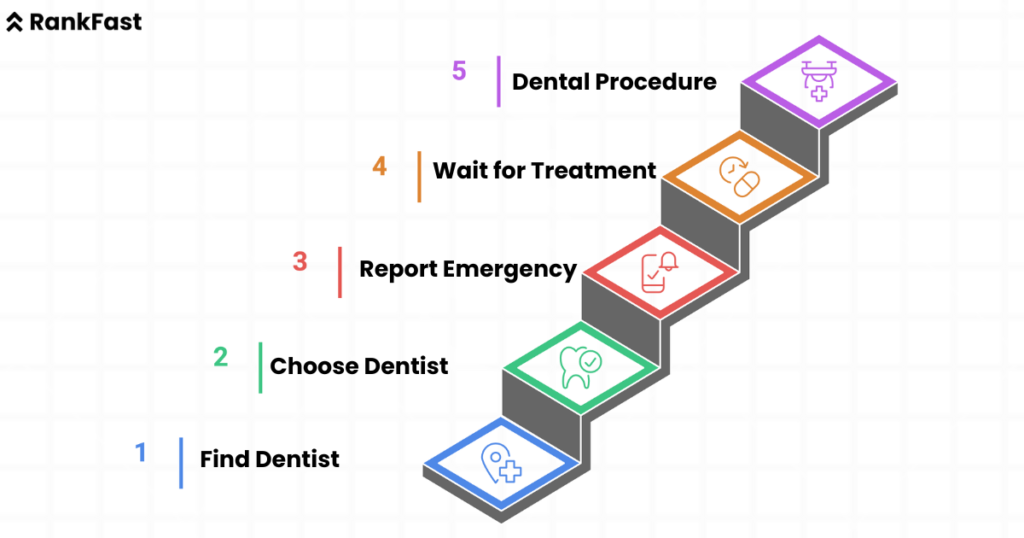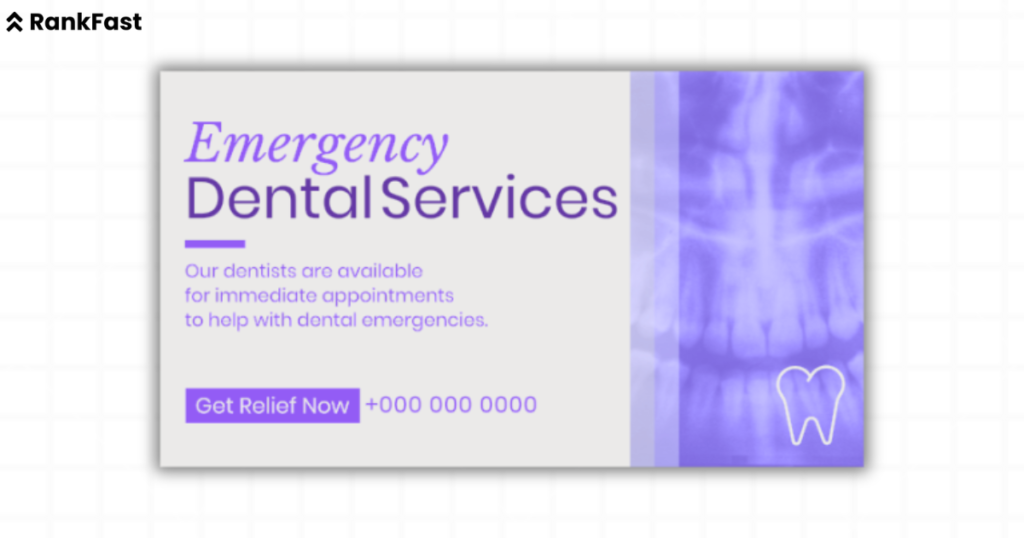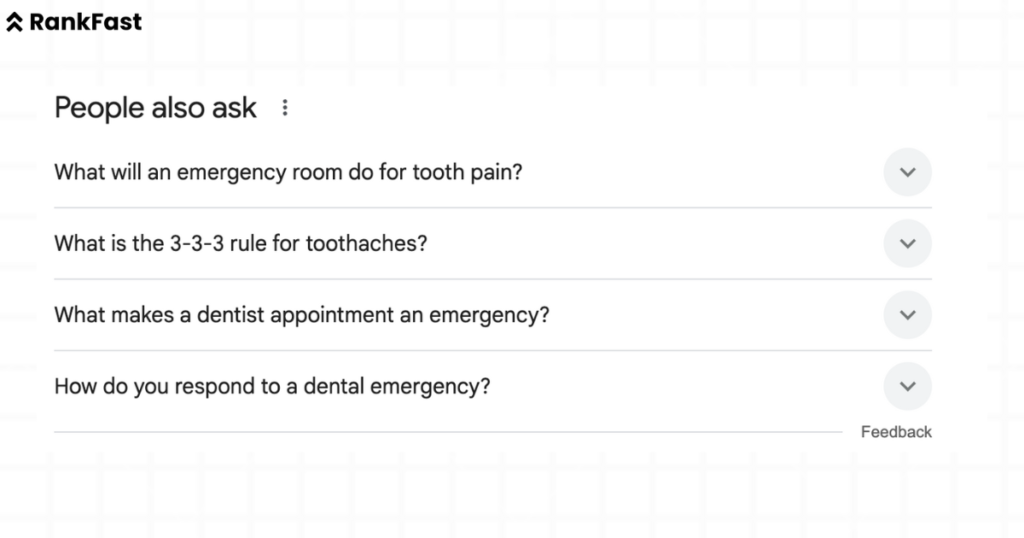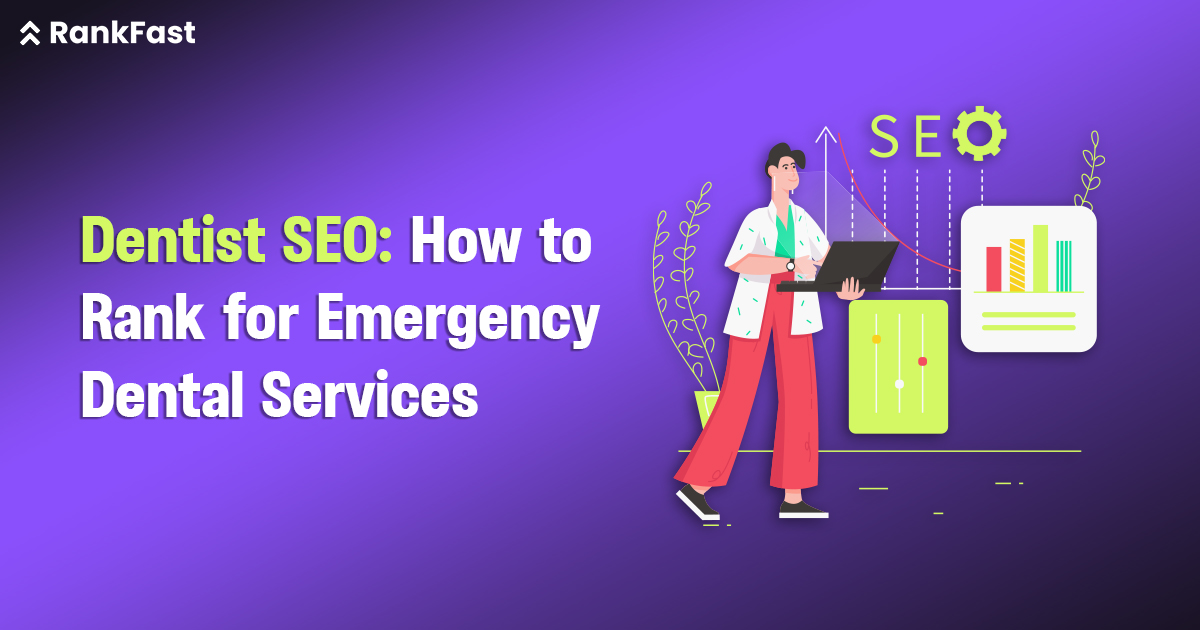What happens when someone wakes up at 2 a.m. with a cracked tooth or unbearable dental pain? They don’t search for a routine dentist. They pick up their phone and type “emergency dentist near me.”
Now here’s the question: Does your dental clinic show up?
Most dental clinics don’t rank for these high-intent searches. And that’s not just a lost click, it’s a missed patient. In the United States alone, 2 million people visit emergency departments every year for dental pain. That traffic could go to local dentists. In fact, the healthcare system could save around $1.7 billion if these cases were redirected.
This blog will guide you on ranking for emergency dental searches through local dentist SEO. We’ll focus on real fixes, not fluff. The goal is to help your clinic show up exactly when it matters.
Why Ranking for Emergency Dental Keywords Matters
Emergency dental search traffic converts faster than regular traffic. People in pain don’t scroll endlessly. They click on the first trusted name they see.
If you rank high, they’ll call you, not your competitor.

The keyword “emergency dental services” has a search volume of 1,600 each month, with a traffic potential of 12,000. That’s not a trend. That’s the demand.
Emergency queries come with high intent. Someone searching “toothache relief now” is ready to act. That means local dentist SEO needs to be sharp, structured, and location-tuned. Emergency traffic is mobile-heavy. If you’re not optimised for these signals, you lose.
Here’s why these keywords matter so much:
- Patients act fast in pain, no time to browse
- High-intent searches mean better conversion rates
- Emergency keywords are less competitive yet urgent
- They attract locals, your primary audience
- They help build brand trust fast
- Your competitors likely ignore this niche
- Emergency SEO supports all your regular dental SEO, too
Now, let’s explore exactly how to rank for emergency dental searches with real techniques.
9 Ways to Rank for Emergency Dental Services
Regular dentist SEO won’t cut it for emergency keywords. You need urgency, relevance, and clear signals. Below are 9 solid techniques to capture this space with your local SEO strategy.
1. Optimize Google Business Profile (GBP) for Emergency Services
First, log in to your GBP. Add “Emergency Dental Service” under services or categories. Use real terms, people search. Update hours to reflect late or emergency availability.
Mention “emergency appointments accepted” in your business description. In the attributes section, add details like “accepts urgent patients” or “walk-ins available.”
Add photos showing your emergency room setup or 24/7 signage if available. Include posts with terms like “same-day tooth extraction” or “urgent dental relief.”
Track performance under “Insights” and update content weekly. This step alone improves your visibility in map packs, especially for mobile searchers nearby.
Remember, Google prioritises proximity, relevance, and activity. Optimise all three here.
2. Use Location-Specific Emergency Keywords
Don’t just use “emergency dentist.” Use “Emergency Dentist in Andheri” or “24-hour dental clinic in Noida.” Always combine the service with the area. These keywords attract urgent local patients.
Here are keyword examples:
- Emergency root canal treatment in Pune
- Urgent dental filling service in Delhi
- 24×7 dental care near Indiranagar
- Emergency pediatric dentist in Hyderabad
- Toothache night relief dentist Mumbai
Add these in page titles, meta descriptions, and H1 tags. Don’t overuse. Make it sound natural. This tells Google that your page answers urgent local queries.
Use them in blogs, FAQs, and Google posts. Even reviews with such phrases can help ranking.
3. Create a Dedicated Emergency Dental Services Page
Don’t mix emergency services with your general dental services page. Create a focused, well-structured page. Explain who you serve, what emergencies you treat, how fast you respond, and who should call.

Example sub-sections:
- What is a dental emergency?
- When to call us
- Common emergencies we treat
- Immediate pain relief tips
- Insurance and pricing FAQs
Use short paragraphs, bullet points, and internal links. Make sure the page is mobile-optimised. Use schema markup to tag it as a service page.
Add localised keywords here too. Target both voice and typed queries.
4. Add Emergency Service FAQs on Homepage and Footer
Users don’t like digging. Keep common emergency questions accessible. Add an FAQ section to your homepage and footer.

Questions can include:
- Can I visit without an appointment for tooth pain?
- Do you offer night-time dental services?
- What to do during a dental emergency?
- How fast can I get an extraction?
- Do you accept walk-ins for dental trauma?
Why FAQs work:
- Improve user experience
- Feed local search queries into Google
- Help voice search results
- Keep the bounce rate low
- Increase page dwell time
Structure each FAQ in 2-3 lines. Use <strong>schema FAQ markup</strong> if possible. That boosts your chance of appearing in rich snippets.
5. Publish Local Emergency Dental Blog Posts
Don’t just post generic blogs. Write emergency-focused content like:
- “What to do if your child chips a tooth in Gurgaon?”
- “Emergency dental care after hours in Bangalore”
- “Tooth pain at night? Here’s what to do before visiting a dentist.”
These blogs should answer urgent questions and use natural, local language. Add keywords, maps, and links to your emergency page.
Blogs keep your website active. Google sees activity as a ranking signal. Aim to publish two emergency-related blogs a month.
Link these posts to service pages. Add FAQs at the end of each.
6. Implement Local SEO Techniques
Even emergency queries depend on the local dentist SEO strength. Without strong local signals, Google won’t trust you.
Here’s what to do:
- Add NAP (Name, Address, Phone) in your footer
- List your practice on top local directories
- Get listed on Justdial, Practo, and Sulekha with the same NAP
- Ask patients to use location keywords in reviews
- Use structured data markup with service location tags
- Link local landmarks in your content
- Ensure the mobile and GPS accuracy of your map pins
These steps help you win the “near me” searches. Most emergency queries include location; you must match that intent.
7. Collect and Showcase Emergency Patient Reviews
Emergency patients are more likely to leave emotional, thankful reviews. This is great for dentist SEO and trust.
Request feedback after emergency appointments. Send a direct link. Ask them to mention what problem they had and how quickly it was resolved.
Display these reviews on your homepage and emergency page. Use review schema markup to help Google display star ratings.
The more specific the review, the better for ranking. Words like “immediate relief,” “walked in without booking,” or “night-time visit” strengthen your emergency relevance.
8. Enable Click-to-Call and Fast Mobile UX
Emergency users don’t send emails. They call. You must have a sticky “Call Now” button on mobile.
Use fast-loading themes. Delay in load = lost patient. Use AMP if needed. Keep your mobile layout clean. No pop-ups.
Make sure your emergency number is in the header, footer, and emergency page. Use local code, not toll-free.
Most “emergency dental services” searches happen on mobile. If your UX breaks there, your ranking and conversions both suffer.
9. Run Location-Based Emergency Ads (Optional)
This is optional, but very effective.
Use Google Ads with location and time targeting. Run them after hours or on weekends. Use keywords like:
- 24/7 dentist near me
- Emergency tooth pain relief in [city]
- Dental clinic is open now in [area]
These keywords convert fast. Set up call-only ads for mobile.
Keep ad copy simple. Match the landing page to the keyword. Add your clinic’s star rating from Google Business Profile if possible.
This isn’t a long-term fix, but it supports your SEO till you rank organically.
Why Emergency Dental SEO Is Different from Regular Dental SEO
Emergency SEO works differently because search intent is immediate. They need answers now. They are not researching. They are reacting.
Here’s how they differ:
| Regular Dental SEO | Emergency Dental SEO |
| Targets general treatments | Focuses on immediate relief services |
| Works on long-term content strategy | Works on urgent, location-based content |
| Users compare and decide | Users act fast and convert quicker |
| Competitive and broad keywords | Less competitive, high-intent keywords |
| Relies on trust-building over time | Relies on fast accessibility and fast response |
For your practice, both strategies should run together. But emergency SEO needs special, focused actions to perform.
Common SEO Mistakes Dentists Make for Emergency Queries
Most dentists lose out not because of Google, but because of avoidable errors.
- Using only general dental terms across the site
- Ignoring location-based emergency keywords
- Not creating a separate emergency page
- Forgetting mobile optimisation for emergency users
- Not tracking emergency service page traffic
- Missing emergency-related schema markup
- Relying too much on paid ads alone
Fixing these gives you a strong edge in local search.
Conclusion
Emergency dental traffic is one of the most valuable sources of local search demand. If your clinic ranks for it, you win patients when they need you the most.
We’ve shown how to do it, from GBP optimisation to emergency-focused content. This is not one-time work. It’s a system. Build it, measure it, refine it.
At Rankfast, we work with dentists who want to dominate local emergency search. If you’re ready to show up when it matters, reach out to us today.
Let’s build your dentist SEO the right way.
FAQs
1. What keywords should I use for emergency dentist SEO?
Use terms like “emergency dentist near me,” “24×7 dental care in [city],” or “tooth pain relief now.” Combine service and location for the best results.
2. Can I add emergency keywords to my Google Business Profile?
Yes. Use them in your business description, posts, and services section. Avoid stuffing them in the business name field.
3. How fast can I rank for emergency dental keywords?
If you optimise your GBP and create dedicated pages, results may appear within weeks. Organic rankings usually build in 2–3 months.
4. Should I run ads for emergency dental terms?
Yes, but only if you can respond fast. Use call-only ads during nights and weekends. Match ads with the right landing page.
5. What page should I link emergency ads to?
Always link to a dedicated emergency dental services page, not your homepage. That improves quality score and reduces bounce rate.
6. Do emergency dental reviews affect SEO?
Yes. Reviews that mention fast service, emergency treatment, or pain relief send strong signals to Google and help your local rankings.

Leave a Reply